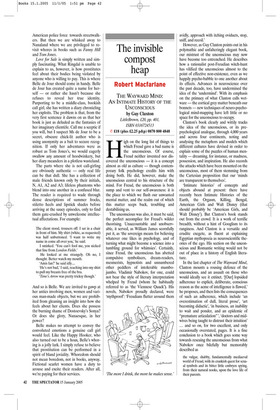The invisible compost heap
Robert Macfarlane
THE WAYWARD MIND: AN INTIMATE HISTORY OF THE UNCONSCIOUS by Guy Claxton LittleBrown, £20, pp. 401, ISBN 0316724513 ✆ £18 (plus £2.25 p&p) 0870 800 4848 High on the long list of things to which Freud gave a bad name is the unconscious. Of course, Freud neither invented nor discovered the unconscious — it is a concept almost as old as culture — though contemporary folk psychology credits him with doing both. He did, however, make the unconscious central to his structure of the mind. For Freud, the unconscious is both sump and vent to our self-awareness: it is the place to which we flush our unwanted mental matter, and the realm out of which this matter seeps back, troubling and destabilising us.
The unconscious was also, it must be said, the perfect accomplice for Freud’s wilder theorising. Unaccountable and unobservable, it served, as William James scornfully put it, as ‘the sovereign means for believing whatever one likes in psychology, and of turning what might become a science into a tumbling ground for whimsies’. Certainly, since Freud, the unconscious has abetted compulsive symbolisers, dream-readers, mesmerists, hypnotists and unnumbered other peddlers of intolerable mumbojumbo. Vladimir Nabokov, for one, could not bear the style of literary interpretation whelped by Freud (whom he habitually referred to as ‘the Viennese Quack’). His novels, Nabokov proudly declared, were ‘mythproof’: ‘Freudians flutter around them avidly, approach with itching oviducts, stop, sniff, and recoil.’ However, as Guy Claxton points out in his polymathic and unfalteringly elegant book, our mistrust of the unconscious may now have become too entrenched. He describes how a rationalist post-Freudian witch-hunt has vilified the unconscious almost to the point of effective non-existence, even as we happily psycho-babble to one another about its effects. Advances in neuroscience over the past decade, too, have undermined the idea of the ‘undermind’. With its emphasis on the primacy of what Claxton calls wetware — the cortical grey matter beneath our bonnets — new techniques of neuro-psychological mind-mapping have left little or no space for the unconscious to occupy.
Claxton’s book clearly and wittily tracks the idea of the unconscious, or its prepsychological analogue, through 4,000 years and across four continents, noting and analysing the metaphors and models which different cultures have devised in order to explain some of the puzzles of human mentality — dreaming, for instance, or madness, possession, and inspiration. He also records the attacks which have been mounted on the unconscious, most of them stemming from the Cartesian proposition that our ‘minds are transparent to themselves’.
‘Intimate histories’ of concepts and objects abound at present: there have recently been Intimate Histories of the Earth, the Orgasm, Killing, Bengal, American Girls and Walt Disney (that should probably be ‘American Girls, and Walt Disney’). But Claxton’s book stands out from the crowd. It is a work of terrific breadth, without a hint of Googlism to its ranginess. And Claxton is a versatile and erudite exegete, as fluent at explaining Egyptian mythopoeia as neuroscientific theories of the ego. His section on the unconscious and Romantic writing would not be out of place in a history of English literature.
In the last chapter of The Wayward Mind, Claxton mounts a rousing defence of the unconscious, and an assault on those who would ideally see it extinct. ‘[Our] lopsided adherence to explicit, deliberate, conscious reason as the acme of intelligence is flawed,’ he proposes, and then lists the consequences of such an adherence, which include ‘an overestimation of dull, literal prose’, ‘art becoming didactic’, ‘in business, an inability to wait and ponder, and an epidemic of “premature articulation”’, ‘doctors and midwives being taught to distrust their intuition’ ... and so on, for two excellent, and only occasionally overstated, pages. It is a fine conclusion to a book which goes some way towards rescuing the unconscious from what Nabokov once bilefully but memorably described as
the vulgar, shabby, fundamentally mediaeval world of Freud, with its crankish quest for sexual symbols and its bitter little embryos spying, from their natural nooks, upon the love life of their parents.





















































 Previous page
Previous page